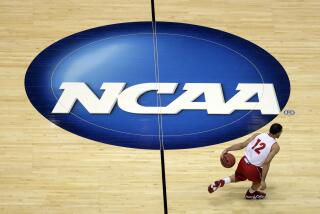Former USC football assistant Todd McNair loses case against NCAA

Nine women and three men on the Los Angeles County Superior Court jury found the NCAA didn’t defame McNair in the case linked to the Reggie Bush extra benefits scandal.
For five and a half days, Todd McNair waited for an answer in the long hallway on the fifth floor of the Stanley Mosk Courthouse.
The former USC assistant football coach drank coffee with seven packets of sugar. Paced. Discussed Dr. Dre and “Game of Thrones.” Shadowboxed. Read message boards on his phone. Flung a wadded-up piece of paper into a garbage can like a basketball. Reminisced about late Trojans running back Joe McKnight. Tried in vain to get comfortable on the narrow wooden benches.
Then the buzzer in Room 500 sounded twice Monday afternoon to signal the arrival of the verdict in the defamation lawsuit against the NCAA that has consumed McNair’s life for seven years.
After more than a week of deliberations, the nine women and three men on the Los Angeles County Superior Court jury found the NCAA didn’t defame McNair in the case linked to the Reggie Bush extra benefits scandal.
The jury didn’t make it past the third of nine questions on the verdict form: whether statements two NCAA committees made about McNair were false. The group voted 9-3 against him on the question.
McNair’s voice quavered as he spoke outside the courtroom: “I’d like to thank all the Trojan faithful, all the fans for supporting me the last seven years. It’s been incredible. It means a lot.”
Members of the NCAA’s legal team exchanged hugs a few feet away.
“We hope that the decision will allow the NCAA, USC and Mr. McNair to move on,” NCAA chief legal officer Donald Remy said in a statement.
McNair sued the NCAA in June 2011 after the NCAA infractions committee found him guilty of unethical conduct in connection with the Bush case. The group sanctioned him with a one-year “show cause” penalty — making it difficult for him to find another college job — and USC declined to renew the coach’s contract.
During the three-week trial, McNair attorney Bruce Broillet accused the infractions committee of changing key evidence related to McNair in order to connect the coach to the Bush scandal and increase sanctions against USC.
McNair hasn’t coached at the college or professional level since being sanctioned. During two days of emotional testimony, he told the jury about sinking into depression, drinking heavily, taking out loans from friends and family, using food stamps and driving for Uber to make ends meet.
The testimony from McNair, who sought $27 million in damages, wasn’t enough.
“If you’re going to come into court and ask for $27 million, you need some corroborating evidence,” Anthony Bruno, a lawyer in L.A. who served as the jury foreman, told The Times in a telephone interview. “All we really had is his own testimony. ... The jury really wanted to get there for him. It was just hard because he has the burden of proof.”
McNair’s complaint also alleged breach of contract and negligence, but his attorneys withdrew the counts before closing arguments. Broillet declined to comment on the decision.
The head juror speculated McNair could’ve won on both counts had they remained. The jury asked Judge Frederick Shaller last week why the counts had been dropped; the judge instructed them not to consider the matter.
“It would be nice if we could’ve had some other tools to get [McNair] something because we felt there was an improper process,” Bruno said.
A series of incendiary emails between nonvoting members of the committee were key exhibits, including one from NCAA infractions committee liaison Shep Cooper in February 2010 that described McNair as a “lying, morally bankrupt criminal.” But Bruno said the jury “barely discussed” the emails because they weren’t relevant to the bottom line.
After the first day and a half of deliberations, the jury sent a note to Shaller on Tuesday: “What do we do if we are deadlocked?” But the discussions continued.
More problems emerged Thursday. The jury sent a note to Shaller saying one juror couldn’t understand evidence because she isn’t conversant in English. Fifteen minutes after the judge decided to keep the juror, the group said it still was deadlocked on the third question on the verdict form.
Shaller was inclined to declare a mistrial if the jury couldn’t progress by that afternoon. But when Bruno asked for an interpreter to assist the juror struggling to understand English and McNair’s attorneys expressed concern the juror wasn’t actively participating in deliberations, Shaller dismissed her and summoned an alternate.
Then deliberations started from the beginning. The group discussed the case for about seven hours over parts of three days before reaching a decision.
After the verdict, the jury answered questions from both legal teams next to a bank of elevators.
“I don’t think the NCAA should come away from this thinking they did things right,” Bruno told the group as several jurors nodded. “I think the entire jury room was very, very disappointed and we wanted to do something. ... I think it’s very clear they weren’t following their own bylaws.”
The elevators dinged. Children scampered past.
“I think it’s safe to say that my client realizes there were issues here,” NCAA attorney Kosta Stojilkovic told the jurors of the infractions process involving McNair.
McNair, who hugged Stojilkovic after the verdict, watched on the edge of the group, hands thrust deep in his pockets.
“God’s got you,” one juror said. “The battle’s not over.”
Follow Nathan Fenno on Twitter @nathanfenno
UPDATES:
7:25 p.m.: This article was updated with quotes from Anthony Bruno.
5:10 p.m.: This article was updated with additional details.
This article was originally published at 2:00 p.m.
More to Read
Go beyond the scoreboard
Get the latest on L.A.'s teams in the daily Sports Report newsletter.
You may occasionally receive promotional content from the Los Angeles Times.







